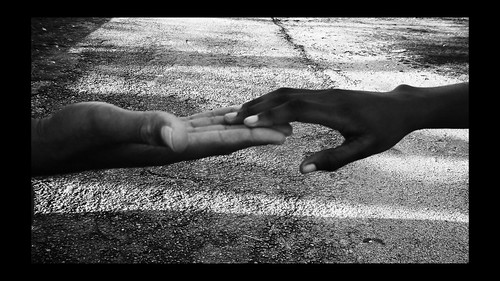 |
| Photo Credit: Golden_Ribbon |
Watch Your Mouth by Randy Nabors
"The consciousness of racial injustice and its attendant social, economic, psychic, emotional, and physical realities are like a punch in the gut. We have no alternative but to spell them out, to both the ignorant and the resistant. Yet, if we allowed hate to fill us, these truths could inflame our hearts and push us to be fiery-eyed zealots and avengers, we instead seek to speak the truth in love; as Ephesians 4:15 teaches us to do. This is not always easy to do, to speak hard truths in love. We cannot be flippant about what love means (claiming we love people but producing no demonstrable proof) in our communication, especially not in having read the James passage in how the “wisdom from above” is to be imparted. In other words people who hear hard truths from us must also hear and feel the love as far as it may depend on us."Surprise! We Need to Learn from Christians from Other Cultures by Amy Medina
"When we talk about church in America with our Tanzanian friends, it's their turn to be shocked. Your church services are only an hour and fifteen minutes long? And that's the only service you attend all week? And you've never, ever done an all-night prayer vigil? Like, never? Are there even any Christians in America? In America, your devotion to Christ is measured by the amount of personal time you spend in prayer and Bible study. Am I right or am I right? Well, in Tanzania, your devotion to Christ is measured by the amount of time you spend in prayer and worship with others. Of course, you might protest that measuring godliness sounds like legalism. Which is true--but we still do it, don't we? If you are American, what would you say to a Christian who never did personal devotions, but spent many hours every week in church worship services? Would you even know where to put that person in your spiritual hierarchy? And would you be able to back up your conclusion with Scripture? It's easy for us, as foreigners, to come to Tanzania and point out what they are doing wrong. Those deficiencies pop up to us broadly and clearly. But I wonder, what if a Tanzanian Christian came to the States and was given a voice in the white American Church? What deficiencies would be glaringly obvious to him?"I preached about a gun rights advocate. He wasn't who I thought. by Amy Butler (USA Today)
"I sat there, startled briefly by the unlikely situation in which we found ourselves. We couldn’t be more different. But Todd and I share at least one fundamental belief: nobody is the stereotype we believe they are. We do ourselves and our world a fundamental disservice when we won’t summon the courage to listen to each other and try as hard as we can to find the things we share, small as they may be."Poll shows a dramatic generational divide in white evangelical attitudes on gay marriage by Sarah Pulliam Bailey (The Washington Post)
"The question for many evangelicals has been whether LGBT issues are matters where they can agree to disagree and still work together, perhaps like the question of when children should be baptized or whether women can be ordained. When the issue came up for World Vision, one of the largest Christian nonprofits in the country, in 2012, the answer was a sharp no — it lost thousands of donors right away. And InterVarsity Christian Fellowship, a major ministry, announced last fall that its employees must affirm its views that marriage is between a man and a woman. Some evangelicals believe there’s a difference between supporting gay marriage as a public policy matter and gay marriage as sanctioned by churches. A large majority of white evangelicals (including younger generations) continue to see homosexual relations as morally wrong, according to the General Social Survey. The 2016 survey found 75 percent of white evangelicals saying homosexual sexual relations are always or nearly always wrong. That number is down from 82 percent in 1996 and 90 percent in 1987. The survey does not show a large generational gap, however. In 2014-2016 surveys, 70 percent of Generation X/millennial white evangelicals said same-sex sexual relations are nearly always or always wrong, compared to 81 percent of baby boomers/older generations."7 ways the iPhone has made life worse by Kara Alaimo (CNN)
I'm an iPhone user but I share the concerns listed in this article from Kara Alaimo. Here she lists seven ways that she feels our smartphones have made our lives worse:
1. They're bad for our brains.Smartphones can be useful if we use them and they don't use us. But these concerns are worth considering.
2. While we're busy on our phones, we're ignoring the world around us.
3. We're also ignoring one other.
4. They're ruining our relationships.
5. They promote FOMO ("fear of missing out") syndrome.
6. We have come to need constant validation.
7. We're expected to be available for work 24-7.
My 3 Big Fears in Parenting Teenagers by Trevin Wax (The Gospel Coalition)
"As fathers and mothers, we model the love of God to our kids in different ways. I know that whenever my children think of their Heavenly Father, they will in some way associate Him with their earthly father. The responsibility of modeling the character of God to my children makes me feel so honored and so inadequate. My fear for the teenage years is that, in the midst of the drama, the mood swings, the debates and disagreements, and the inevitable growth of independence, I will respond in ways that push my kids away from God instead of toward Him. That I will consistently model something untrue about God. For this reason, I pray that God would give me a soft and repentant heart, a willingness to own up to my sins, so that our kids would see that leadership in the home is not opposed to admitting I'm wrong, or that I need forgiveness. I also pray that God will not allow my fear of making mistakes to make me passive and thus forfeit my leadership role through apathy. A good father needs to have a combination of grace and boldness, with strands of love and authority tied so tightly you can't untangle one without the other."

